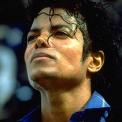The Legacy of Michael Jackson
 What did the King of Pop bequeath to the world? Your answer will probably depend on your view of American pop music.
What did the King of Pop bequeath to the world? Your answer will probably depend on your view of American pop music.If you take the view that American pop music is nothing but a manufactured product designed to exploit human lust and desire, then you will focus on the seamy side of Jackson's career: the occasionally risque song lyrics and video images; the strangely whitened skin (caused by a disease called vitiligo, which destroys pigment); the bizarre cosmetic surgery that left him with an eerie mask-like appearance; and the tortured private life, tarnished by unproven but damning accusations of child molestation. Like Elvis Presley, Jackson became a superstar when he was too young to handle it, and by the time of his early death, he had become a freak.
But there is another side to Jackson. If you take the view that American pop music grows out of a rich tradition of song, dance, and showmanship created by African Americans but now practiced by performers of all backgrounds, then you will focus on the highlights of Jackson's career: the irresistible 10-year-old star of the Jackson 5; the gifted vocalist of Thriller (the 1982 album that has sold almost 65 million copies worldwide); the astonishing dancer whom critics compared with Fred Astaire and Rudolph Nureyev; the creator of artful music videos; and finally, the master of the extravagant live stage show.
What is the relationship between these two sides of Michael Jackson? The answer lies in the larger cultural context within which he lived. If Jackson had been born 50 years or even 25 years earlier, he would have joined a long list of extraordinary African-American musicians working in a succession of popular but also challenging styles: ragtime at the turn of the 20th century, jazz in the 1920s, swing in the 1930s, rhythm and blues in the 1940s, rock and roll in the 1950s. Or perhaps, coming as he did from a religious family (his mother is a devout Jehovah's Witness), Jackson would have been one of the century's great gospel singers.
Any of these styles would have kept Jackson close to what is best in American music. Indeed, he got his start within that tradition: the all-male singing group put together by his father has a long pedigree in both religious and secular realms. But Jackson was born in 1958 and began his career a decade later, during the tumultuous late 1960s, when pop music was changing very quickly - and not always for the better.
The greatest frustration of Jackson's life was that he never repeated his early success with Thriller. He tried, and several of his later albums sold millions of copies. But there was something magical about Thriller that seemed to elude him for years afterward. What was the source of that magic? I would say Quincy Jones, the older man who produced Jackson's first three solo albums.
Quincy Jones was born in 1933 and is still going strong, a trumpeter, arranger, producer, and all-around master who got his start playing and arranging for superb artists: Lionel Hampton, Sarah Vaughan, Count Basie, Duke Ellington, Gene Krupa, Ray Charles, Dizzy Gillespie. Not only that, but he studied composition with Nadia Boulanger and Olivier Messiaen in Paris. Few people on this earth know African-American music as well as Jones, and he wove that knowledge into every track of Thriller.
But nothing succeeds like success, and after his next album, Bad, Jackson decided that he did not need Jones any more, and the two parted company. The magic went out of Jackson's music at that point, and in my opinion, it stayed out. And Jackson let this happen because, after all, this was the 1980s, and there was more to being a superstar than just singing and dancing. There was MTV.
Amazing as it sounds, MTV in the early 1980s played mostly white acts, and for a while refused to air Jackson's videos. Finally his record company threatened MTV, and they yielded, only to discover that their largely white audience adored Michael Jackson. After this triumph, Jackson vowed to break every other barrier as well, and be accepted as a major artistic talent.
But unfortunately, Jackson's universe did not include the culturally sophisticated attitudes of the dominant musical style of the 1980s: the British New Wave. With its roots in punk, the visual arts, and trendy downtown fashion, the New Wave depended less on artistry than on attitude - a campy, ironic attitude that mocked commercial success while also pursuing it. This kind of thing was beyond Jackson's comprehension, and when the British press dubbed him "Wacko Jacko," he was deeply hurt.
Here we find the real explanation for Jackson's weird, sentimental notion of himself as a "spiritual" artist, a veritable angel of love. It was the only way he could fight back against the dark, cynical tone of the musical styles that surrounded him: punk, grunge, alternative, gangsta rap. It was a hit with people all around the world. (See comments from former Soviet bloc countries on the RFE-RL website.) But this was never enough. Jackson also longed to be taken as seriously at home, as seriously as the stars of these cynical styles. But he never was. The critics dismissed him as "pop," and the rest of the media focused on his eccentricities, not his genius.
Perhaps now that Michael Jackson has passed from the scene, it will be possible to reverse these priorities.
June 27, 2009 3:18 PM
| Permalink
